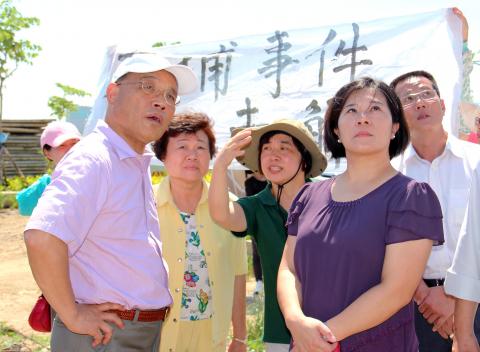Democratic Progressive Party (DPP) chairman Su Tseng-chang (蘇貞昌) yesterday visited the four families in Dapu Borough (大埔), Miaoli County, whose houses were demolished last month, condemning the county government and pledging his efforts to amend laws concerning land expropriation.
“There are times when the government has to expropriate private land for the benefit of the public, but this should happen only when it is absolutely necessary for the good of the public — not for the good of big corporations or political leaders,” Su said.
“When the government takes private land, it must make sure that the expropriation is carried out in an appropriate manner,” Su added.

Photo: CNA
“The government should not view those who oppose the expropriation as enemies. Government leaders should not tear down people’s houses whenever the ‘godgiven opportunity’ presents itself,” he said.
Su was referring to the Miaoli County Commissioner Liu Cheng-hung’s (劉政鴻) response to criticism over the demolition of the houses belonging to families of Chang (張), Chu (朱), Huang (黃) and Ko (柯) when the families and their supporters protested the forced demolition plan in Taipei last month.
After speaking with the four families and visiting their houses — as well as the site where the Changs’ house once stood — Su said he understood why the demolitions had caused upset, adding that the county government’s reasoning that traffic would be blocked if the houses were not demolished was “just an excuse.”
During the visit, Chang Sen-wen (張森文), one of the former occupants of the demolished houses, asked Su to help to find ways to rebuild their homes.
Chang’s wife, Peng Hsiu-chun (彭秀春), urged the DPP to work to amend laws concerning the expropriation of private lands and houses, “because this could affect everyone.”
DPP Legislator Wu Yi-chen (吳宜臻), who accompanied Su on the visit, said the DPP caucus would do its best to campaign for the revision of the Land Expropriation Act (土地徵收條例) and the Agricultural Development Act (農業發展條例).
“The Land Expropriation Act needs revision to guarantee a more just and transparent review process for land seizure,” Wu said.
“It is surprising that there currently is no mechanism to protect farmers from having their farmland taken by the government. Instead, there are clauses facilitating the expropriation of farmlands for development projects,” Wu said.
Wu added that besides amending the laws concerning land expropriation, she would try to make a law on farmlands.
“At this point in time, I think we need more comprehensive laws to protect our farmlands from being used for non-agricultural purposes,” Wu said. “This would be the next appropriate step after amending the Land Expropriation Act and the Agricultural Development Act.”

Alain Robert, known as the "French Spider-Man," praised Alex Honnold as exceptionally well-prepared after the US climber completed a free solo ascent of Taipei 101 yesterday. Robert said Honnold's ascent of the 508m-tall skyscraper in just more than one-and-a-half hours without using safety ropes or equipment was a remarkable achievement. "This is my life," he said in an interview conducted in French, adding that he liked the feeling of being "on the edge of danger." The 63-year-old Frenchman climbed Taipei 101 using ropes in December 2004, taking about four hours to reach the top. On a one-to-10 scale of difficulty, Robert said Taipei 101

A preclearance service to facilitate entry for people traveling to select airports in Japan would be available from Thursday next week to Feb. 25 at Taiwan Taoyuan International Airport, Taoyuan International Airport Corp (TIAC) said on Tuesday. The service was first made available to Taiwanese travelers throughout the winter vacation of 2024 and during the Lunar New Year holiday. In addition to flights to the Japanese cities of Hakodate, Asahikawa, Akita, Sendai, Niigata, Okayama, Takamatsu, Kumamoto and Kagoshima, the service would be available to travelers to Kobe and Oita. The service can be accessed by passengers of 15 flight routes operated by

Taiwanese and US defense groups are collaborating to introduce deployable, semi-autonomous manufacturing systems for drones and components in a boost to the nation’s supply chain resilience. Taiwan’s G-Tech Optroelectronics Corp subsidiary GTOC and the US’ Aerkomm Inc on Friday announced an agreement with fellow US-based Firestorm Lab to adopt the latter’s xCell, a technology featuring 3D printers fitted in 6.1m container units. The systems enable aerial platforms and parts to be produced in high volumes from dispersed nodes capable of rapid redeployment, to minimize the risk of enemy strikes and to meet field requirements, they said. Firestorm chief technology officer Ian Muceus said

MORE FALL: An investigation into one of Xi’s key cronies, part of a broader ‘anti-corruption’ drive, indicates that he might have a deep distrust in the military, an expert said China’s latest military purge underscores systemic risks in its shift from collective leadership to sole rule under Chinese President Xi Jinping (習近平), and could disrupt its chain of command and military capabilities, a national security official said yesterday. If decisionmaking within the Chinese Communist Party has become “irrational” under one-man rule, the Taiwan Strait and the regional situation must be approached with extreme caution, given unforeseen risks, they added. The anonymous official made the remarks as China’s Central Military Commission Vice Chairman Zhang Youxia (張又俠) and Joint Staff Department Chief of Staff Liu Zhenli (劉振立) were reportedly being investigated for suspected “serious